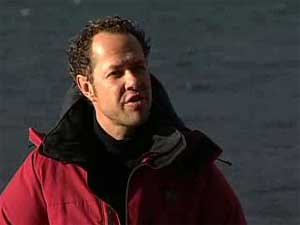 |
| Boris Worm |
Its findings are startling. A global study led by HÂþ»Ãs Boris Worm shows current trends projecting the collapse of all currently fished seafoods before 2050. The international group of ecologists and economists show that the loss of biodiversity is profoundly reducing the oceanÃs ability to produce seafood, resist diseases, filter pollutants, and rebound from stresses such as over-fishing and climate change. The study, published in the November 3rd issue of the journal Science, reveals that every species lost causes a faster unraveling of the overall ecosystem. Conversely every species recovered adds significantly to overall productivity and stability of the ecosystem and its ability to withstand stresses.
 Also see VIDEO "Every species counts"
ÃWhether we looked at tide pools or studies over the entire worldÃs ocean, we saw the same picture emerging,â says Dr. Worm. ÃIn losing species we lose the productivity and stability of entire ecosystems. I was shocked and disturbed by how consistent these trends are à beyond anything we suspected.â
The four-year analysis is the first to examine all existing data on ocean species and ecosystems, synthesizing historical, experimental, fisheries, and observational datasets to understand the importance of biodiversity at the global scale.
Every species matters
The results reveal global trends that mirror what scientists have observed at smaller scales, and they prove that progressive biodiversity loss not only impairs the ability of oceans to feed a growing human population, but also sabotages the stability of marine environments and their ability to recover from stresses. Every species matters.
The good news is that the data show that ocean ecosystems still hold great ability to rebound. However, the current global trend is a serious concern: it projects the collapse of all species of wild seafood that are currently fished by the year 2050 (collapse is defined as 90 per cent depletion).
Collapses are also hastened by the decline in overall health of the ecosystem à fish rely on the clean water, prey populations and diverse habitats that are linked to higher diversity systems. This points to the need for managers to consider all species together rather than continuing with single species management.
Fundamental change needed
ÃUnless we fundamentally change the way we manage all the oceans species together, as working ecosystems, then this century is the last century of wild seafood,â says co-author Steve Palumbi of Stanford University. The impacts of species loss go beyond declines in seafood. Human health risks emerge as depleted coastal ecosystems become vulnerable to invasive species, disease outbreaks and noxious algal blooms.
Many of the economic activities along our coasts rely on diverse systems and the healthy waters they supply. ÃThe ocean is a great recycler,â explains Palumbi, ÃIt takes sewage and recycles it into nutrients, it scrubs toxins out of the water, and it produces food and turns carbon dioxide into food and oxygen.â But in order to provide these services, the ocean needs all its working parts, the millions of plant and animal species that inhabit the sea.
The strength of the study is the consistent agreement of theory, experiments and observations across widely different scales and ecosystems. The study analyzed 32 controlled experiments, observational studies from 48 marine protected areas, and global catch data from the UNÃs Food and Agriculture OrganizationÃs (FAO) database of all fish
and invertebrates worldwide from 1950 to 2003. The scientists also looked at a 1000-year time series for 12 coastal regions, drawing on data from archives, fishery records, sediment cores and archeological data.
Can losses be reversed?
ÃWe see an accelerating decline in coastal species over the last 1000 years, resulting in the loss of biological filter capacity, nursery habitats, and healthy fisheries,â says co-author Heike Lotze of HÂþ» who led the historical analysis of the Bay of Fundy, Chesapeake Bay, San Francisco Bay, and the North Sea, among others.
The scientists note that a pressing question for management is whether losses can be reversed. If species have not been pushed too far down, recovery can be fast à but there is also a point of no return as seen with species like northern Atlantic cod.
ÃThe data show us itÃs not too late,â says Worm. ÃWe can turn this around. But less than one per cent of the global ocean is effectively protected right now. We wonÃt see complete recovery in one year, but in many cases species come back more quickly than people anticipated à in three to five to 10 years. And where this has been done we see immediate economic benefits.â
The study was based at the National Center of Ecological Analysis and Synthesis (NCEAS), funded by the National Science Foundation, the University of California and UC Santa Barbara.
HÂþ» is a world leader in ocean research. Find out more:
